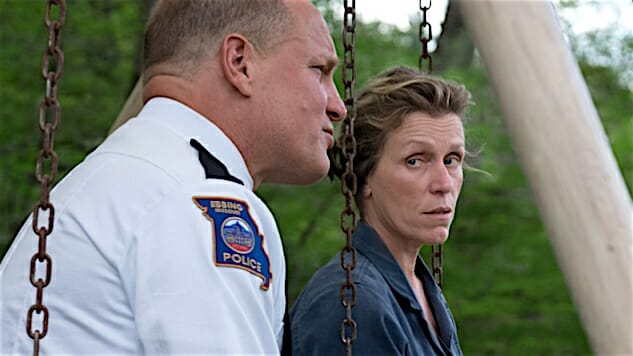Three Billboards Outside Ebbing, Missouri

Whether it’s Our Town or Dogville, fiction occasionally uses small towns as a microcosm for America at large, showing what’s wonderful or toxic about our country. Judging by the new film Three Billboards Outside Ebbing, Missouri, the state of our union is fractious and violent—and only getting worse. You probably didn’t need a movie to tell you that, but writer-director Martin McDonagh’s volatile comedy-drama keeps poking at our scabs, pinpointing our humanity and surprising us with a series of small revelations. This is a film that’s proudly impertinent but also deeply morally serious. And even if Three Billboards doesn’t always hold together, that’s appropriate for its anxious characters who are, themselves, a little unsteady.
The film stars Frances McDormand as Mildred, a divorced mother who lives in a rural Missouri community. Everybody in a small town knows everybody else’s business, and Mildred is Ebbing’s walking tragedy: She’s the woman whose teen daughter was recently raped and murdered. Unhappy that the local police force, led by the cantankerous Sheriff Bill Willoughby (Woody Harrelson), has failed to find her girl’s killer, Mildred decides to take action, buying up three billboards outside of town and splashing an accusing message across them: “Raped while dying. And still no arrests. How come, Chief Willoughby?”
The billboards create a sensation in this little burb, irritating Willoughby but incensing his hothead underling, a rookie cop named Dixon (Sam Rockwell), who has a reputation for being especially vicious in his handling of African-American suspects. Some want Mildred to take the billboards down, but she refuses: The way she figures it, the more attention she brings to the months-old case, the better chance there is of the perpetrators being found.
An acclaimed playwright who also wrote and directed In Bruges and Seven Psychopaths, McDonagh incorporates the same unruly mixture of corrosive language, brutal violence and soulful characters that have been the hallmarks of his previous film work. There’s nothing quaint or homespun about Ebbing’s denizens, and McDonagh gives them a no-nonsense simplicity that allows for blunt exchanges. People in Three Billboards say what they think, and because it’s McDonagh providing the dialogue, they’re often funny and eloquent in a plainspoken way. But early on in the film, there’s also a clear indication that Mildred’s simmering resentment and pain is just one of the festering wounds in this town. And by escalating matters with the police, she’s lit a fuse.
McDormand plays Mildred with righteous fury, reveling in the character’s gruff, ass-kicking demeanor. Mildred is all too happy to tell off the priest who comes to her home to advocate taking down the billboards—the tirade she delivers about the hypocrisy of the Catholic Church feels pent-up, prepared, as if she’s been waiting her whole life to start giving people a piece of her mind. But the Oscar-winning actress also twists the knife, showing how pleased Mildred is with her own insolence. There’s no question this mother has good reason to be aggrieved, but slowly McDormand and McDonagh reveal the anger and unpleasantness that, we come to suspect, might have always been there—even before this tragedy. This is a tricky proposition, but McDormand challenges our ability to easily sympathize with Mildred. As traumatized as she is by her daughter’s death—a crime, which we’ll discover, has also provoked a lot of guilt on her part—she can be quite cruel to those trying to be kind, most memorably during a wonderfully awkward date with Peter Dinklage’s shy, sweet suitor.
-

-

-

-

-

-

-

-

-

-

-

-

-

-

-

-

-

-

-

-

-

-

-

-

-

-

-

-

-

-

-

-

-

-

-

-

-

-

-

-








































